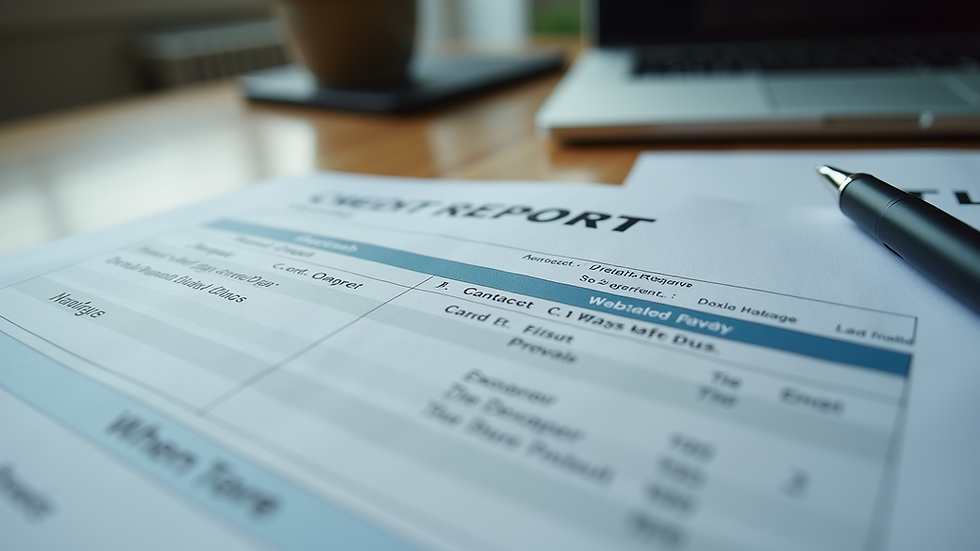How to Dispute Errors on Your Credit Report
- COACH JOE™

- Jul 26, 2025
- 4 min read
Credit reports are essential in shaping our financial health. They influence our ability to secure loans, rent an apartment, and even apply for jobs. However, they can sometimes include errors that may negatively impact your credit score. If you find inaccuracies in your report, knowing how to navigate the credit dispute process is crucial for your financial well-being. In this article, we will delve into how to dispute errors on your credit report and ensure that your financial history accurately reflects your identity.
The Credit Dispute Process
Disputing errors on your credit report is more straightforward than many think. The Fair Credit Reporting Act (FCRA) allows consumers to dispute inaccurate or incomplete information in their reports. Here’s a step-by-step breakdown of the credit dispute process:
Obtain Your Credit Report: Before you can dispute an error, you need to have a clear understanding of what is on your report. You are allowed one free credit report each year from annualcreditreport.com. Review your report carefully for any discrepancies.
Identify the Error: Common errors include incorrect personal details, wrong account statuses, or accounts that do not belong to you. Write down each inaccuracy you find.
Gather Documentation: Collect any evidence supporting your dispute, such as payment receipts or bank statements. This documentation will be essential in proving your case.
Contact the Credit Reporting Agency: Reach out to the relevant major credit bureaus (Equifax, Experian, TransUnion) either online or via mail to file your dispute. You can submit supporting documents alongside your request.
Follow Up: After you file a dispute, the credit bureau will investigate within 30 days. They will notify you of their findings. Follow up if you do not receive a response.

What Happens After Filing a Dispute?
Once you've submitted your dispute, the credit bureau will contact the creditor to verify the information in question. They will investigate and typically respond within 30 days under the FCRA regulations.
Outcome of the Investigation: If the creditor cannot verify the information, the bureau will remove it from your report. If the information is verified, the report remains unchanged.
Receive Results: You will receive a written notification of the results of your dispute. If the error is corrected, you may also receive a new credit report reflecting those changes.
What If You’re Unhappy with the Result?: If you disagree with the results, you can ask for a statement of dispute to be included in your credit file, which consumers can read if they view your report in the future.
What Do You Say in a Credit Dispute?
Writing a credit dispute letter can be essential in ensuring that your voice is heard. When composing your letter, keep the following points in mind:
Be Clear and Concise: Start by stating your purpose clearly. For example, "I am writing to dispute an inaccuracy on my credit report." Include your full name, address, and Social Security number for identification.
State the Error: Describe the error in detail, including the exact item you are disputing. For instance, "The account listed as delinquent on [date] is not my account."
Provide Evidence: Include copies of any documentation that supports your claim. Highlight pertinent points related to the discrepancies.
Request Correction: Clearly request the action you want the credit bureau to take, for example, "I request that you investigate this matter and update my record accordingly."
Signature: End the letter with your signature and a printed name.

Maintaining Your Credit Report After a Dispute
After successfully disputing errors, maintaining a clean credit report will require diligence:
Regular Checks: Frequently check your credit report for new inaccuracies. Make it a habit to review it at least annually.
Financial Accountability: Pay bills on time, monitor your credit utilization, and avoid excessive hard inquiries.
Consider a Credit Monitoring Service: Some credit monitoring services can alert you to changes in your credit report, which may expedite the identification of discrepancies.
Importance of Correcting Credit Report Errors
Addressing inaccuracies in your credit report can have significant benefits. Here's why it matters:
Better Loan Rates: A correct credit report can lead to lower interest rates when applying for loans.
Improved Credit Score: Fixing errors can help increase your credit score, making you more attractive to lenders.
Peace of Mind: Knowing your credit report reflects accurate information provides peace of mind and stability in financial decisions.
Final Thoughts on the Credit Dispute Process
Disputing errors on your credit report is not only your right as a consumer but also a vital step in protecting your financial health. The process may seem daunting at first, but by following these steps diligently, you can rectify inaccuracies that may be holding you back.
Taking action against credit report errors may feel overwhelming, but with the right information, it becomes manageable. Consistently monitor your report and retain knowledge about the dispute process to safeguard your financial future effectively.

In conclusion, understanding how to dispute credit errors can unleash the potential for improving your credit score and financial opportunities. Take charge of your credit today and ensure every detail reflects your true financial history.





Comments